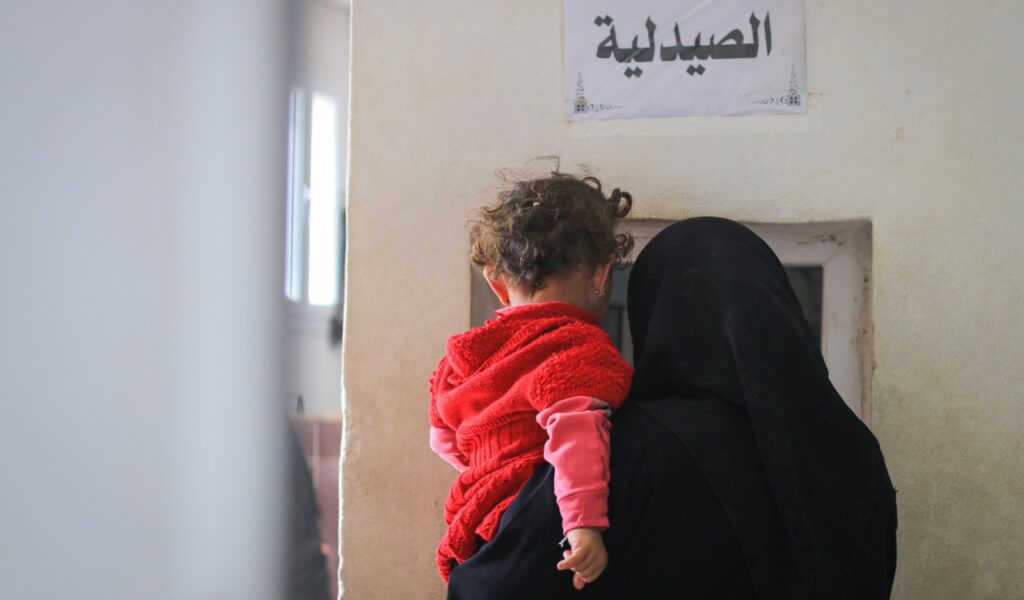
By Maria Giovanna Mariani, RSC Intern
Current humanitarian crises are severely affecting health especially for the most vulnerable populations. Approximately 300 million people worldwide need urgent humanitarian assistance,[1] with the MENA region accounting for 36% of the global humanitarian burden and 60% of the world’s refugees stemming from this area. Women and children often being the first to flee.[2] Following World Health Day on the 7th of April, we must remember that millions worldwide still lack essential health services. Securing access to primary healthcare for everybody is vital, as health is a fundamental human right that guarantees access to other rights such as food, safe water, and a healthy environment, while also contributing to the general well-being of the entire population, peace and security.
In a protracted refugee crisis, many factors act together affecting people for a long time. This includes increased demand for medical services, medicines, and healthcare personnel, which can overwhelm local systems. Refugees frequently arrive with pre-existing health conditions or develop new health issues due to lack of access to care, poor living conditions, inadequate sanitation and access to clean water. Protracted crises can lead to higher incidences of mental health issues among both refugees and host community members. The stress of conflict, loss, and uncertainty can overwhelm local mental health services, which are often already under-resourced. Refugees may face barriers in accessing health services due to legal, financial, or social obstacles, leading to disparities in health outcomes between refugees and local populations.
Generally, hosting large numbers of refugees often strains the existing healthcare resources of the host country, creating a complex interplay of increased demand, resource constraints, and public health risks that require coordinated responses from governments, NGOs, and international organizations.
Since 2011, Jordan has hosted more than 1.3 million Syrian refugees (12% of the country population).[3] Despite Jordan’s healthcare system demonstrating key strengths in managing the refugee crisis by providing assistance and protection to large number of refugees, the Syrian influx has certainly placed an immense pressure on the national health system, making it challenging for both refugees and the host community to receive timely and quality treatment.
Furthermore, the current uncertainty surrounding foreign aid exacerbates these challenges. According to UNHCR, in Jordan, for instance, over a quarter of refugees may risk losing access to essential health services due to the actual funding shortages, threatening mental health care and maternal services. About 335,000 refugee women of reproductive age are at risk of losing vital maternal health services, which could lead to dire consequences without adequate funding. With insufficiency of proper investment and support, health systems cannot sustain.
In 2007, the World Health Organization (WHO) launched a description of what is called the ‘6 building blocks of health systems’ aimed at creating a functional health system to ensure equitable, human rights-based promotion of physical and mental well-being:
Long-term systemic reforms are essential to enhance the equity and sustainability of healthcare provision. A comprehensive strategy should include:
Increased Funding and Resources: Governments must prioritize health as a right, embracing a multi-sectoral approach to dismantle barriers, and ensure equitable access to quality care for all. Providing healthcare for refugees requires resources and it is costly. Adequate and predictable financial support is a crucial responsibility to ensure that healthcare services can meet the rising demands from both refugees and the host community. This includes a commitment to long-term funding solutions that prioritize healthcare as a vital aspect of humanitarian response.
Policy Changes: Governments and donors should explore the feasibility of a range of options, considering refugee-inclusive policies. Expanding the government’s health insurance system and attempting to gradually include all refugees into the national health system could be a win-win solution, rather than creating a separate double standard for refugees, that is often more expensive and unsustainable. An inclusive perspective to healthcare system through the support of the international community will ensure that the whole society receive equal and improved essential health services.
Inclusive Healthcare System: Improving the healthcare of refugees and vulnerable population requires a multisectoral response, including more work opportunities to allow refugees becoming self-reliant even for medical care, unlocking their capacity to thrive and contribute meaningfully to society. This would partially alleviate the fiscal burden on governments for health expenditures and would also improve the quality of care, while maintaining a better prevention and control on communicable diseases and possible outbreaks.
Awareness and Community Support Initiatives: Civil society plays a crucial role in building healthcare networks and addressing barriers that obstruct access. Advocacy for refugee inclusion and data-driven accountability in the health sector is essential. The WHO emphasizes that public health involves organized societal efforts to promote and protect health
Strengthening Collaboration: Partnership between governments, international donors, refugees’ and local communities is essential to safeguard resources, funds, capabilities for building country’s resilience while facing ongoing and future challenges. Strengthening health in host countries will ensure that both refugees and local society receive equal and improved essential health services, making health an instrument to sustainably reach social, political, and economic development.
[1] https://betterworldcampaign.org/blog/ocha-the-un-agency-coordinating-humanitarian-assistance#:~:text=300%20Million%20People%20Worldwide%20Need,Front%20Lines%20%2D%20Better%20World%20Campaign
[2] World Health Summit 2023 Humanitarian health in war and conflict.
[3] https://www.worldbank.org/en/country/jordan/overview
Our flagship newsletter provides a weekly round-up of content, plus receive the latest on events and how to connect with the institute.